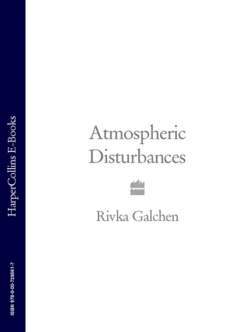Читать книгу Atmospheric Disturbances - Rivka Galchen - Страница 15
5. An initial search
ОглавлениеHow did I search the city for Rema? I found myself standing in front of the Hungarian Pastry Shop, in front of its fogged windows into which no child had yet traced patterns. Below the windows: the pastel mural of slightly deformed angels. To the left: stacked white plastic chairs. To the right: a man descending into the sidewalk cellar holding a tray of uncooked dumplings, the wrappings pinched and pointing to the sky. And, still standing outside, reflected in the glass, was—and for a moment I didn’t recognize him—me: hairy handed and slope shouldered and not as tall as I like to think I am. With a rising sense of ridiculousness, the thought surfaced: this is how I search for my wife? This was probably the one place she almost certainly would not turn up. Like the most gumshoe of all gumshoes, I’d gone where I wanted her to be, not where there was any reason or unreason for me to believe she actually would be.
I went inside anyway—it was warm and humid, like a room for leavening. Near the pastry display case, a young boy was patting at the pocket of his mother’s (I assume his mother’s) coat shouting biscotto! biscotto! A skinny vulture of a man—he had terrible eyebrows—watched from the table; he was a regular who typed pompously, and flirted with the waitstaff, and I’d once overheard him say he was into meditation, and I thought of him like a disease. A little farther back I saw the crowd I thought of as “the dirty kids”: two messy girls who seemed always to have just left a medieval fair—eternally in old velvet or silk or lace—and a young man, with unwashed hair and a small cartoon bear nose, who perpetually wore a shapeless too-short leather jacket. He looked sad that day; the girls were consoling him. Also I saw a pretty wavy-haired undergrad with her thin arms bare. A little boy was crawling under her table and he picked up and turned over a pale green scrap of paper.
Sometimes it terrifies me, when I sense the exponenting mass of human lives—of unlabeled evidence of mysteries undiscerned—about which I know nothing.
“What did you say?” someone said maybe to me.
“Nothing,” I said to almost no one.
Having pined for Rema in the past in this very place (her tea’s leaves would stack up in the sieve and look like topiary) I felt my new loneliness echo against the anxiety I used to have watching the door wondering if Rema would walk in, and that feeling was then echoing against the haunting vision I used to have of Rema’s cornsilk hair, which was echoing against the memory of that first day I saw Rema see me notice that she had looked at me after which she had then quickly looked away, all of which echoed against a sensation of her kissing my eyelid, which made me shiver.
It was very bad, the acoustics inside of me.
I wanted, suddenly, to leave.
I ordered a coffee to go—a terrible coffee that pleases only for bearing the name coffee and for being hot. I walked over to Broadway, went underground, boarded the number 1 train heading downtown. Each time new passengers came on, I watched expectantly. Near the bottom of the island, I exited, ascended, crossed the street, redescended, waited, and reboarded the subway going uptown. At the third stop, a man entered the subway car and announced loudly: “I had already apologized, for those of you who did not know.” Then he said those same words again, and again, and again, so I realized he wasn’t speaking to me, at least not in particular. But I anyway couldn’t help but feel that what the man really meant was that I should be sorry, that I should apologize. Maybe everyone on the train felt as I did, that they were the point of all this, of everything. It was like when the music comes on at the Chinese restaurant and suddenly even the random movements of the fish in the aquarium seem choreographed, thick with meaning; then the music pauses and meaning abruptly disperses. The fish seem dumb, as do all the diners.
At the 110th Street stop I exited and began a repeat of the whole cycle. Later I did sit for a few hours at the coffee shop, made some drawings of sugar cubes, and of an upside-down cup, and of the pattern that a small coffee spill made when it was soaked up by a napkin, a pattern like an archipelago.
Though my initial progress did not look or feel like progress, I believe it was a kind of progress, that of just staying in place, of not slipping backward into despair.
